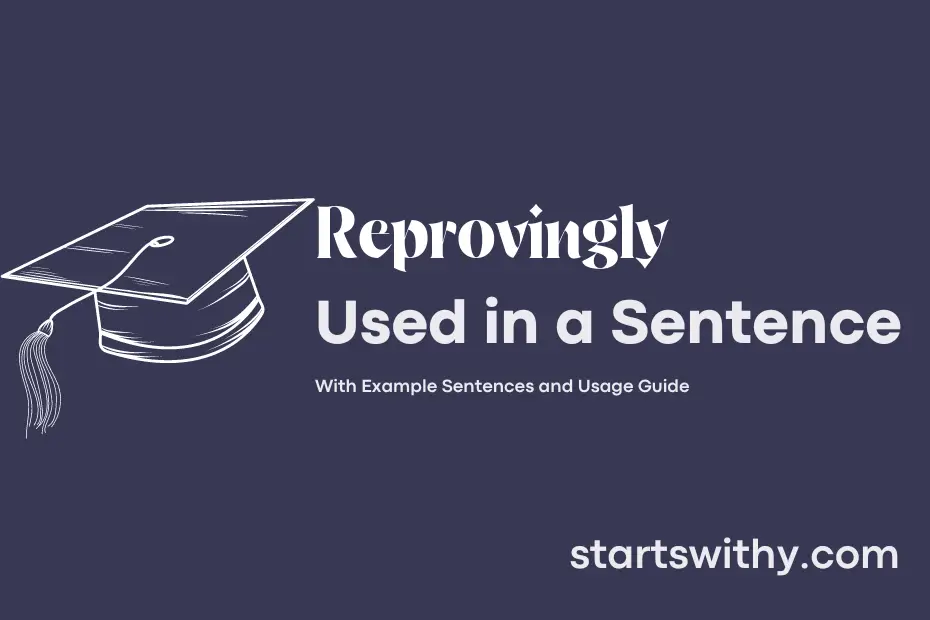Have you ever received a look or tone that silently scolded you for a mistake? That’s the essence of “reprovingly.” When someone speaks or acts reprovingly, they are communicating disapproval or correction, often without saying a word.
Using “reprovingly” in a sentence can convey subtle yet powerful messages. Whether a parent, teacher, or friend, mastering this word can help you express your disappointment or disagreement in a dignified manner.
7 Examples Of Reprovingly Used In a Sentence For Kids
- Sit up straight in class, the teacher said reprovingly.
- The mother looked at her child reprovingly when he didn’t finish his vegetables.
- The policeman spoke reprovingly to the children about the importance of road safety.
- The librarian glared reprovingly at the students who were being too loud.
- Wash your hands before eating, the nurse said reprovingly.
- The principal looked at the students reprovingly for not following the school rules.
- The coach spoke reprovingly to the team about the importance of playing fair.
14 Sentences with Reprovingly Examples
- The professor looked reprovingly at the students who were talking loudly during the lecture.
- The librarian glanced reprovingly at the student who was eating snacks in the library.
- The senior student shook his head reprovingly at the freshmen who were being rowdy in the dormitory.
- The counselor raised her eyebrows reprovingly at the student who skipped multiple classes.
- The class representative sighed reprovingly at the group of students who submitted their assignments late.
- The professor stared reprovingly at the student who was caught plagiarizing in their essay.
- The academic advisor looked reprovingly at the student who failed to meet the minimum GPA requirement.
- The peer tutor spoke reprovingly to the student who was not taking their studies seriously.
- The college administrator shook their head reprovingly at the group of students who vandalized campus property.
- The student leader raised their voice reprovingly at the members who were not following the organization’s guidelines.
- The lab assistant gave a stern look reprovingly to the student who mishandled the equipment.
- The student mentor spoke reprovingly to the students who were engaging in unhealthy behaviors.
- The college coach looked reprovingly at the team members who were not giving their best effort during practice.
- The debate club president sighed reprovingly at the members who were not prepared for the competition.
How To Use Reprovingly in Sentences?
Reprovingly means to scold or rebuke someone in a disapproving or critical manner. Here is a guide on how to use it in a sentence:
- Identify a situation where someone is being chastised or corrected for their behavior.
- Use the adverb Reprovingly to describe how the scolding or rebuke is being done in a disapproving manner.
- Place the word Reprovingly in your sentence to modify the action of scolding or rebuking.
Example sentence: “The teacher looked at the misbehaving student reprovingly as she pointed out his disruptive behavior in the classroom.”
In this sentence, the word Reprovingly is used to show how the teacher scolded the student in a disapproving manner for his disruptive behavior.
Remember to use Reprovingly when you want to convey a sense of disapproval or criticism in the way someone is scolding or rebuking another person. Practice using this word in different contexts to become more comfortable incorporating it into your everyday vocabulary.
Conclusion
In conclusion, sentences with reprovingly convey a sense of disapproval or criticism towards the actions or behaviors of others. These sentences are often used to admonish or scold someone for their perceived wrongdoing, with a tone that suggests a moral high ground. By using language that is reprovingly, the speaker aims to correct the behavior of the listener or express their disapproval in a direct manner.
Whether in personal interactions, written communications, or literature, sentences with reprovingly serve as a tool to hold individuals accountable or to express a sense of disappointment. This style of sentence can be effective in guiding others towards more socially acceptable behaviors or prompting self-reflection on one’s actions. Overall, sentences with reprovingly play a role in shaping social norms and expectations through the reinforcement of moral values.



